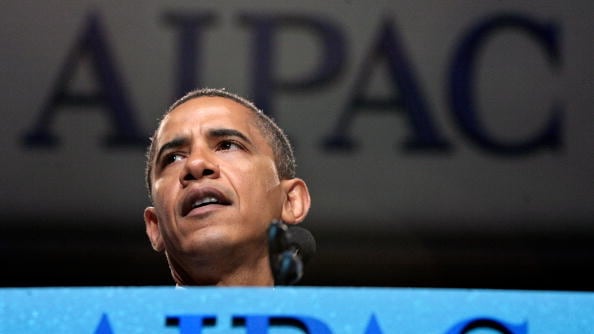Last week, Politico ran a story on the silence of Jewish pro-Israel lobby groups regarding U.S. intervention into Syria, with a focus on AIPAC. It’s a fair question to ask: AIPAC’s mandate is the strengthening of the U.S.-Israel relationship, it is one of Washington’s most powerful lobbies, and the Syrian civil war does affect American and Israeli interests in the region.
One might, then, expect it to take a public position on the biggest issue of the day, U.S. strikes against the regime’s military assets. And after President Obama announced he was going to Congress for authorization for the attack, observers began wondering—with some claiming more confidently—that AIPAC would become much more active. Apparently White House officials even fear what AIPAC will do. If Obama is seen as not enforcing his red line over Syria, how, one hinted, would this “800-pound gorilla in the room” view the Administration’s Iran policy.

I wouldn’t expect AIPAC to play a prominent role in the debate over Syria, though, because (1) there’s so much uncertainty around President Obama’s Syria policy; (2) Syria is simply not one of its priorities; and (3) there is concern over being tarred with a position of supporting American wars in Israeli interests.
There has been plenty of criticism about Obama’s Syria policy, from the left, the right, and policy hands in between. It appears, without any further explanation from the White House, that Obama intends to simply punish the Assad regime by striking some of its military assets, and then bring the planes and ships home. This will, in the end, leave conditions pretty similar to what they were prior to any strike.
Given AIPAC’s own uncertainty and Israel’s conflicted position on the civil war, it wouldn’t make sense for the organization to push out ahead on Syria and take an active role in lobbying Congress. It’s not going to spend its capital on Syria when it has bigger issues that require more sustained attention: U.S. aid to Israel, and Iran.
This is not to say that AIPAC thinks Syria is irrelevant. It does have an official position, composed of three points: concern over human rights violations, Syria’s role in a regional terror network, and its nuclear program. But Syria matters to the extent it fits into the organization’s major concern, the Iranian nuclear program and its threat to Israeli and American interests. AIPAC has not been reticent about making this point, and this is why we might expect AIPAC to agree to help the Administration lobby Congress on Syria. Reinforcing the red line over the regime’s use of chemical weapons—that is, showing determination to confront the deployment of weapons of mass destruction and a willingness to use force to promote its interests—is considered a necessary element of Washington’s Iran policy.
Finally, AIPAC is well aware of what comes out in the Politico piece as something more ominous: “The silence could be a problem for Obama, since the Jewish groups are connected across the political spectrum, wielding influence from the far right to liberal Democrats on issues critical to the Middle East—especially when it comes to the use of military force.”
The implication that American Jews have considerable influence over when Washington uses its military is problematic enough, but is exacerbated by the shade of the 2003 Iraq war—inaccurately believed by many to have been pushed by American Jews, especially AIPAC—and AIPAC’s efforts to punish Iran for its nuclear program—its real goal, as conceived by many, an American military attack on Iran. The specter of Jewish control, couched in its most distinguished form by the Mearsheimer-Walt assertion, makes it difficult to think about or analyze the politics and lobbying of pro-Israel Jewish groups without drifting into accusations of inappropriate influence.
Jewish control was never an accurate depiction of reality, but even so, AIPAC has become more aware of this and altered its activities accordingly. Its position—or lack of one—on Chuck Hagel’s nomination as Defense Secretary might have been the beginning of this broader process; namely, a more careful lobbying, particularly on issues that are not “life-or-death” and are open to gentle prodding. It seems to be eschewing the more belligerent lobbying that characterized the 1990s, when both American presidents (George H.W. Bush) and Israeli prime ministers (Yitzhak Rabin) had to take it to task for its reckless interventions. This will continue on Syria.
None of this is to say it won’t get involved: it’s likely that AIPAC will support the Administration’s efforts to convince Congress to authorize the president to use force against Syria, especially if asked. But providing information and talking points to members of Congress at the request of the president on an issue it either doesn’t feel strongly opposed to or even agrees with isn’t the same as fighting over a policy it views as a priority. Sometimes, it’s just not about AIPAC.



